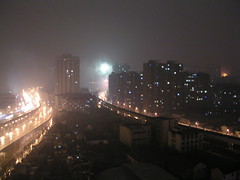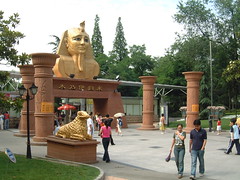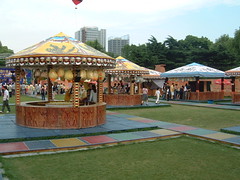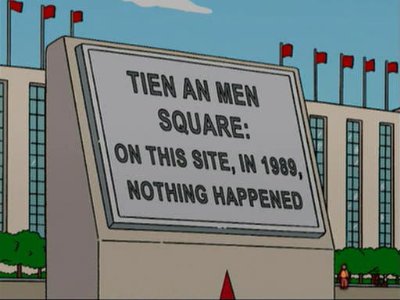07
Jul 2005Talk Talk
Since I personally verify every blog that is added to the China Blog List, I see a lot of blogs. Unfortunately, I have very little time these days to read blogs, and I’m not really looking for new ones to add to my reading list. One that nevertheless caught my attention, though, was Talk Talk China. I especially like DD’s entries.
There are not a lot of entries up yet, but these are the ones I liked:
– Language Rapists. Another variation of a familiar theme. Worth reading. It has a great closing line. (Here’s my version of this rant.)
– No, You’re Not Really Tone Deaf. Sometimes I feel this way, but I’d never write something like this. …but that doesn’t mean I can’t enjoy it when someone else does!
– Beijing Cab Driver Excuses. Pretty funny. Read the comments… I found the comparison between Shanghai and Beijing cabbies to be kinda interesting.
06
Jul 2005Pudong Skyline and Globalization
Patrick at Ape Rifle is working on his dissertation, and the topic relates to Pudong’s skyline and globalization. The focus is pretty abstract. Here’s a quote:
> In my dissertation, I’m going to explore how much the lived reality/built form of Lu Jia Zui actually conforms to its commonly imagined ‘global’ skyline. Much discussion of globalization in the relevant literature talks as if there are some intangible forces floating around the world, homogenizing cities and transforming cultures. However, what is not so often discussed is that the whole idea of ‘globalization’ is nothing but a theoretical abstraction; it can hardly come knock at your door anymore than it can build a skyscraper. ‘Globalization’ , on the ground, is nothing more than the built form produced by belief in it. The production of ‘global’ spaces thus has little to do with abstract forces, and a lot to do with real possibilites/constraints.
As for specifics…
> In this dissertation, I want to use Lu Jia Zui to critique the notion that ‘globalization’ somehow produces homogenous landscapes in ‘global’ cities, especially when dealing with financial districts. As an image, perhaps, Lu Jia Zui is similar to New York or Canary Wharf here in London, but in reality it is a place that defies simplistic description as abstract ‘global landscape’ and ends up being strangely Chinese.
This sort of discussion is not exactly my cup of tea, but I know that more than a few China watching philosopher-types read this blog, and many of them even have intimate knowledge of Shanghai. If that’s you, please read the original entry and give Patrick some input.
05
Jul 2005Three Kingdoms Comic
A comment on my Origin of Koi entry led me to the Three Kingdoms Comic. Wow! Impressive. I’m not sure whether to be more impressed by the concept* or by the fact that it’s available in English, Chinese, Japanese, Korean, and Thai! I haven’t gotten a chance to read them all yet, but I definitely will.
Since last year I’ve been a big fan of webcomics. My favorites:
– Dinosaur Comics. Ryan North’s sense of humor is the greatest. It amazes me how he can reuse the same panels over and over and still manage to crack me up every damn time.
– Perry Bible Fellowship. Reminds me of the Far Side, but it’s anything but derivitive.
– Nine Planets Without Intelligent Life. Good concept, good (but slow-moving) story.
– Beaver and Steve. Weird humor, cute style.
– Questionable Content. Indie rock post-Friends twenty-something sitcom comic.
– A Softer World. Reminds me of SNL’s old “Deep Thoughts,” with accompanying photography.
* I know that the story of War of the Three Kingdoms has been done in comic form before, but this is a webcomic. Difference.
04
Jul 2005Reason for Celebration
I should be arriving in Tampa when it’s this time there. 5:30am Eastern Standard Time, not 5:30am China Time, that is. (Sorry you have to come pick me up so early, dad!)
It’s the 4th of July. Ever since living in China (and especially since having stayed at ZUCC, unofficial random meaningless fireworks capital of Zhejiang), fireworks are about as special to me as chopsticks. They’re really no big deal at all for me. And I’m normally not one to reflect much upon the meaning of “freedom” or independence from colonial rule on this day.
Still, it’s so nice to be back in a country where I can access any website I wish. Right before leaving China, there was a surge in blockings — TypePad blogs were reblocked, Blogsome (which I had recommended to potential China bloggers before) blogs were blocked, and I was having a lot of trouble accessing Micah’s blog. It seems like the shadow of the Great Firewall is getting longer and darker. (I’ll update the CBL to reflect these new blockings soon.)
The good news in these dark times is that the new Adopt a Blog is coming along. So is the new China Blog List. More news on that soon.
Happy Fourth of July.
Related: More details at Peking Duck
03
Jul 2005Over the Pacific
As you read this, I am already onboard an airplane with my girlfriend bound for the USA. We left Pudong International Airport around 1pm today, flew to Seoul, and are currently bound for L.A.
Now, I’m not blogging from first class or anything so fancy-pants bourgeoise as all that. I’m using WordPress’s scheduled posting feature. It’s pretty cool! I decided I didn’t want to waste precious time at home blogging, so I put up some posts ahead of time so that my site doesn’t go un-updated for all that time.
In L.A. we have a five-hour layover before flying to Tampa, so I’m meeting up for dinner with two friends I know from China who live in L.A. One of them is none other than the infamous “Da Xiangchang.” He posts a lot of over-the-top comments here (and a lot of good ones as well), but before any of that we were friends in China. I haven’t seen him for a while.
While I’m in the States I won’t be working on my website much, but I hopefully will be doing some work on Adopt a Blog. My original page for it is being combined with the work that some other people have contributed this year and it will all soon be online at a new location. I finally found an overseas sponsor! I’ll have to save the official announcement for when it’s actually done, though.
I’ll be back in Shanghai July 18th.
01
Jul 2005It's About to Get Hotter…
…in my apartment. No more free power. They came and fixed the power meter on Wednesday.
China giveth, and China taketh away…
But having almost seven months of free power is pretty cool.
Also, Carl moves out this weekend, so I’ll be down to just one roommate. We’ll miss him, but we’re glad to see him find a good job and move forward. We’re not looking to find a new roommate… we’ll see if we can afford to have a guest room.
30
Jun 2005Origin of Koi
So many inventions and customs originated in China that it’s not uncommon for me to learn one that I never knew about before. Sometimes, however, the claims get a little ridiculous.
My favorite is the claim that the Japanese are actually a lost tribe of Chinese from southern Zhejiang, and that the Japanese language has evolved out of the dialect of Wenzhou. I think the first part is simply a creative attempt to explain Japan’s financial success while holding onto Chinese pride. The second part is undoubtedly rooted in the fact that a lot of Chinese people think that Wenzhou’s dialect–a dialect reknowned for being totally unintelligible to speakers of virtually any other dialect in China–sounds like Japanese. The people that say it sounds like Japanese usually understand no actual Japanese. As someone that understands Japanese, I can assure you that Wenzhou-hua sounds nothing like Japanese.
Recently I ran into another possible example of a far-fetched claim related to Japan. The claim is that the practice of keeping koi (colorful carp) originated in China. I immediately found this suspect, but then figured it was probably largely because my time spent in Japan was my first significant contact with the tradition, and the word koi has been imported into the English language from Japanese (not Chinese) recently. Obviously, neither of these reasons are real evidence that the practice of raising koi really originated in Japan.
I checked my favorite reference, Wikipedia. The koi entry had this to say on the matter:
While a Chinese book of the Western Jin Dynasty (4th century) mentions carp with various colors, Koi breeding is generally thought to have begun during the 19th century in the Niigata prefecture of Japan.
This doesn’t prove anything conclusively, so I thought maybe it would be wise to ask an actual domesticated carp where the practice originated:

Yeah, I thought so.
29
Jun 2005Going Cold and Warming Up
When was the last time you felt infatuated? You met a new person, and there was just chemistry and excitement, and you couldn’t wait to see them again. But pretty soon, the spark was gone. You start to wonder what happened. Were you out of your mind before, or are you in a funk now? Pretty soon it doesn’t matter… the infatuation is over.
I have to admit: that’s how I feel about the Shanghai band Cold Fairyland (冷酷仙境).
Don’t get me wrong — Cold Fairyland is an awesome band, and I respect them a lot. They do an amazing and artistic mix of traditional and modern sounds. I also like how they almost never use English, no matter how many foreigners are at their shows.
The first show of theirs I saw at the Ark left me reeling. It was a truly amazing set, paced and executed expertly, driving the whole place into a dizzying climax. I was totally infatuated after that show. The two shows I have seen since then–one at the Ark again and one at the Creek Art Center–have led to me falling out of the infatuation.
I realized that they only have two songs that I really like. Those are their two rockingest songs. The others are cool, but when it comes to music, I have pretty simple tastes. For me, going to a Cold Fairyland show is kind of like going to an art museum to see an exhibit where I only end up liking one or two paintings. It’s sort of interesting, in that artsy “I’m appreciating culture” way, but it’s not exactly fun for me.
After the show on Saturday Brad and I headed over to Tang Hui (唐会). Ever since I first caught the live performances there, Tang Hui has been the only bar in Shanghai that I can say I really like. The shows I liked were put on by the owner, 张笃, a Chinese guy from Xinjiang who goes by the nickname of 竹马 (get it? 笃 = 竹马). He’s also the front man in his own band. He does a wicked cover of “No Woman No Cry” (who would have thought a Chinese guy could do such an authentic-sounding Jamaican accent??), some classic rock, and some cool ska Elvis covers. He and his friend from Xinjiang (who does a great “Nothing Else Matters” cover) also do some amazing rock versions of Xinjiang folk songs. I have no idea what they’re singing, but it sounds great. I thought Shanghai entertainment didn’t get much better.
Well, it gets a little better. Recently Tang Hui started giving this one Chinese woman a lot of time on stage, and she is amazing. She’s got a low, throaty voice, and the way she belts out songs makes for top-notch entertainment. Her songs are covers, and on Saturday night she did a bunch of Nirvana covers. Holy crap, I never thought a woman could do such awesome Nirvana covers. They weren’t even all the ones you’d expect, either — she did a few not on Nevermind like “Stain.” I was enthralled.
I was never really into cover bands before, but damn… that’s entertainment.
P.S. If you go to Tang Hui for the live music, don’t sit in the outer “hallway section.” It reduces the experience by approximately 60%.
Related:
– Micah’s opinions of Saturday’s Cold Fairyland show (he liked it)
– Dan’s review of Tang Hui, with address (this review was written pre-kickass singer chick, btw)
28
Jun 2005Burger King failed me
Burger King has come to Shanghai! Today was its first day open. Having no better lunch plans, I decided to make the 10 minute walk down there on my lunch break for a Whopper. It was pretty packed. I couldn’t tell how crowded it was at first, because they made the odd decision of putting the ordering counters on the second floor.
After waiting in line for about 10 minutes and getting no closer to the cashier (numerous pseudo-lines were forming around me, merging into my line), I decided to leave rather than getting angry. The line had grown quite a bit in the ten minutes I had been standing in line, so I had quite a few people to push my way through. The new arrivals were all murmuring, “it’s the same price as McDonalds.” Yup. Big surprise. About 18 rmb for a combo meal.
I’ll have my Shanghai Whopper one of these days. In the meantime I guess I’ll have to keep eating delicious nutritious Chinese food. Dammit.
Related: Shanghaiist on Burger King
28
Jun 2005Running the Gauntlet
I recently read a funny posting on Shanghai Craigslist by an American about his daily walk to work. It’s basically a long rant about the types of people he can’t stand on the way to work:
1. Parasol Ladies
2. Loogie Guys
3. Lords of the Crosswalk
4. Guys Who Try to Hand Me Things
5. Sidewalk Scooter Drivers
Yes, it’s more exapt complaining, but it’s pretty funny (and only mildly offensive). I can identify all the groups he mentions, and I feel his pain. I’m pretty sure Craigslist ads are deleted after a certain period of time, so I wanted to preserve it for posterity. (I hope that’s cool with you, D.)
27
Jun 2005Truly Asia
This morning when surfing CNN.com I ran across this ad for travel to Malaysia:

Truly Asia, eh? The implication there is that there are some “so-called Asia” nations that are actually no more than a bunch of posers. Which nations are the posers, I wonder? Anyone care to speculate?
I also began to wonder: does China have any similar tourism slogans, or is it too busy scaring off the rest of the world to bother? What slogans might China use if given the chance?
Here are a few suggestions:
– Asia-er than you.
– More Asia than you can handle.
– The only source of Asian culture.
– The real Asia. (don’t be fooled by imitators)
– Not as communist as you think.
Feel free to add your own.
25
Jun 2005Out with the Old
Last December when I first moved into my current apartment near Zhongshan Park, I take one look out the 20th floor window at the old buildings across the river and thought, “those won’t last long.” It wasn’t just that they were old; they were clearly of low quality as well. What’s more, on every side were highrise apartment complexes. I felt pretty sure those structures were doomed.
Here is the only picture I have of that whole area. (Unfortunately it’s a bad picture of Chinese New Year fireworks, so you can’t see the buildings very clearly.)
Here is another picture of the same area, taken last month. The demolition began in early May, I believe.
If you look carefully you can see which buildings were taken out. The residential area at the left is still intact, but I’m certain it’s only a matter of time.
It seems to be popular among some expat circles to mourn the loss of these “traditional” dwellings. Personally, I think that’s ridiculous. I’ve seen the buildings on the left close up, and they are constructed extremely shoddily. You hear about third world living conditions in Shanghai — well, this is one of those places. Those buildings–like most buildings in Shanghai–are not even very old. They were just built with inferior materials, so they seem like they have real history. If Shanghai wants to modernize, it really needs to tear down as many of this kind of building as possible and start building quality structures in their places.
I’m not completely heartless, though. There’s a tragedy here, and it’s about the people. (Isn’t it always, in China?) The people that live in that area live in those wretched conditions because they’re poor. Knocking down their homes doesn’t help them at all; it just means they’ll be forced to relocate, while rich people move into the new highrise that’s built on the ruins of their old homes.
You know this kind of thing goes on every day in Shanghai, but it feels strange, watching it happen bit by bit from my very own home…
23
Jun 2005China's New Reality
Time has a new “photo essay” called China’s New Reality.
Is there anything new about this? Lame, lame, lame. I can find more interesting China photos browsing Flickr or even friends’ sites.
Via AAIC.
22
Jun 2005好久不写
不好意思,我已经很久没写中文blog了。我不是不想写。问题是这里不能留言了,我得换blog软件。我已经换了英文blog的软件,挺麻烦的。我目前没有时间换中文blog的,但没有留言功能就没劲。但我一定会换blog软件并继续写这个blog!
好消息:考试通过了。看来我从9月份就是华师大的研究生了!
22
Jun 2005The Mummy in Shanghai
Ever since the May holiday, Shanghai’s Zhongshan Park has been housing a big The Mummy Returns promotional activity. It’s like a mini Egypt-themed fair. The main entrance of the park is all Egypted out, and a huge-screen (but low-res) TV has been installed which shows nonstop The Mummy Returns clips, interspersed with advertisements for the mummy fair going on inside the park. Each ticket costs a ridiculous 80 rmb per person.
After you pay, you head into the park and find the mummy section. If you’re unlucky there’s a line. (There were really long lines all throughout the first week of May, but there rarely are now.) You’re herded into the mummy’s temple, a sort of Egypt-themed haunted house. The haunted house was actually quite well done. The best part was all the workers inside dressed up like statues (they really did look like statues). They would remain motionless for a while, and then suddenly come to life, totally freaking people out. Good stuff.
When you come out you’re in the familiar carnival setting. You are surrounded by booths selling everything from National Geographic videos to The Coffee Bean Tea Leaf refreshments. There are lots of impossible games you can play, paying with expensive tokens for a chance at impossible odds to win a virtually worthless “prize.” The familiar favorites were there: shooting (ridiculously small) hoops, fishing, ring around the bottle, etc. The one game with decent chances was a dart game. You just had to pop balloons with darts to win your crappy prize.
If you’re there at the right time, you may also get to see a live show. Yes, it’s Shanghai’s version of the Egyptian craptacular! When I was there the performances alternated between dances which tried to stay on theme, using Middle Eastern music and costumes, and dances which seemed to appeal to teenagers, using flashy clown colors and pop music. Guess which are which!
All this is somewhat odd, of course, but the big question in my mind is: WHY? The Mummy Returns was released in 2001! Why go to all this work to promote a movie that’s already four years old? (I think the event has increased sales of pirated copies, though.) Is it a coincidence that Shanghai started whoring out Zhongshan Park to carnivals the same year that it stopped charging park admission for a lot of its parks?
P.S. Did anyone think it strange that there were Egyptian designs behind the video Coke machine I wrote about? Didn’t think so. Well, it was at this Mummy Returns carnival.
21
Jun 2005The Simpsons on China
First the hilarious South Park dodgeball episode (I hear that one provides great discussion material for the classroom), and now this! I’m definitely going to have to see this episode.
Via Wayne.
20
Jun 2005Video Coke Machines
Is this common back in the States now, or is this marketing trick being tested here in Asia? You can’t tell from this shot, but that screen at the top right is displaying nonstop Coca-Cola advertising.
The people at Coca-Cola are pretty much universally regarded as marketing geniuses. What, then, were they thinking when they thought this up? Apparently it’s supposed to work something like this:
You’re walking by a Coke machine. You don’t feel like a Coke. But then you notice something new: a video screen on the Coke machine! You are lured in by the familiar glow, then entranced by the saccharine smiles of the pretty people on the screen all going gaga over Coca-Cola. Suddenly you’re thirsty…
KA-CHING!
Yeah… somehow I don’t buy it. It is sort of a novelty the first time you see it, but after that, you ignore it as usual. I’ve never seen anyone watching the screens. Seems like an awfully big investment, considering I am seeing these things all over Shanghai now.
Does this make any sense at all?
19
Jun 2005Shanghai Jobs for Caucasians
It’s happened again! My company needs more foreigners. Last time I whined about this on Sinosplice for several months Micah ended up working here. Success! As the company grows, however, two foreigners are not enough. They’re looking to hire up to four more.
Anyway, if you have some English teaching experience and you speak Chinese, you might be interested in the position. Check out Sinosplice Jobs for the details and shoot me an e-mail if you’re interested.
Now for the bad news. Not only does the company hire only native speakers of North American English, but they want them to be white as well.
At first I denounced this as just blatant racism, but it’s actually a little more complex than that. My company has actually hired Chinese Americans before. The problem is that when clients hire a teacher or a teacher trainer from our company and they pay extra for a foreign teacher, they are looking for the “whole foreigner experience.” That means not Asian, because other Asians look too much like the Chinese, and that’s just boring. And it means not black or Indian simply because a lot of Chinese people are racist. If the company actually tried to use non-whites as teacher/trainers, most of the clients would just reject them and demand a white one.
Yes, it’s still a racist hiring policy. It’s clear that the bottom line is money, and if being anti-racism means less profit, then the company isn’t going to do it. This attitude is pretty prevalent. What’s really needed is to attack prejudices at their roots — in households. Then demand will change and businesses will respond. The sad thing is that foreign teachers in kindergartens are a great way to give kids positive exposure to foreigners at a young age, and it would be much more beneficial if the foreigners weren’t limited to mainly white ones.
17
Jun 2005Trojan!
Somehow I’ve got a trojan on my home computer. I’m always very careful, but being caerful wasn’t enough. I’ve gotta stop doing dumb things.
I downloaded a file via BitTorrent. I scanned it with AVG, and it said the file was clean. When I opened it, my system got infected. Now AVG very helpfully reports every 5 minutes that I have this trojan in my system, but it can’t get rid of it.
The most annoying thing about this trojan is that it prevents me from going online. So I can’t even get the necessary information/fixes to get rid of it without using someone else’s computer. Today at work I’ve downloaded a bunch of trojan/worm removal software. Hopefully at least one of those programs will do the trick. In the meantime I’ll be posting a little less than usual.
15
Jun 2005Free Power?
I moved into my current apartment in Shanghai on December 10, 2004. That means I have been living here for over half a year. In all that time, not a single electricity bill has showed up.
At first my roommates and I didn’t mind; we figured it came every few months. As the months started to add up, however, we got nervous. The three of us used the heat a fair amount during the winter, which, with three people, could easily amount to 500 rmb or more per month. We didn’t want to get slammed with that all at once.
I told my landlord about the problem, and she told me to check with the apartment administration. They said they didn’t handle that. I relayed this to my landlord, and she said she’d handle it. More time passed.
Recently my roommate Carl has landed a new job that will necessitate his relocation to another part of Shanghai. Carl has never been one to waive any power consumption rights, so we definitely wanted to settle the matter of the electricity bill before he moved (and before the sum got too huge). So recently I asked my landlord about it again, stressing the urgency. This time she got answers.
What she told me is that the power meter has been broken all this time, and she’d have it fixed soon. Furthermore, we wouldn’t have to pay for the power we have used in the past six months!
I find it a little hard to believe. Could the power company make such a mistake? Power just doesn’t get given away for free. Could it have been my landlord’s mistake, and somehow she won’t be able to determine how much we’ve used, so she’ll have to pay the sum herself? That doesn’t seem likely, because the power company should be able to tell her the amounts.
If we really don’t have to pay those six months of power bills and the power meter has still not been fixed yet, then I think it’s time to get busy using some more free power. Somehow, though, I think this bill will find its way to us down the road. In the meantime, it’s nice to think we got six months of free power.











